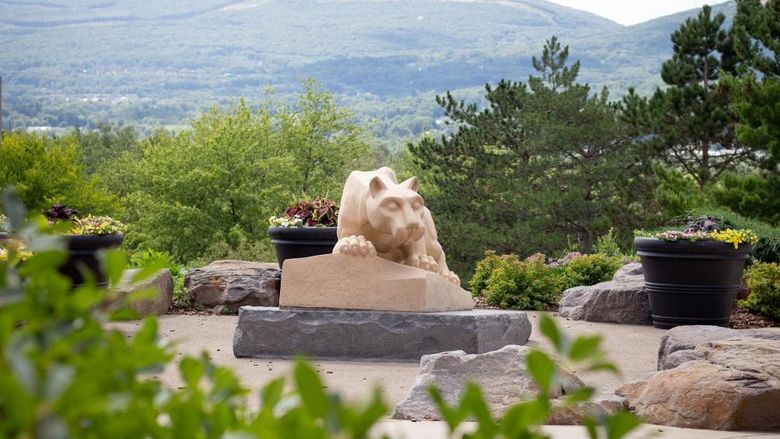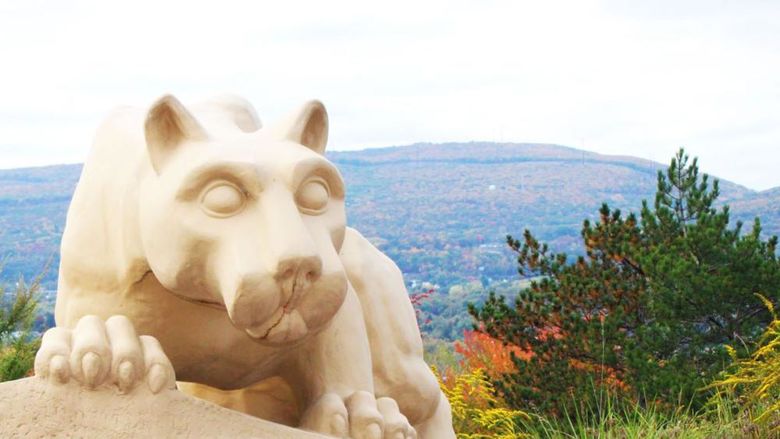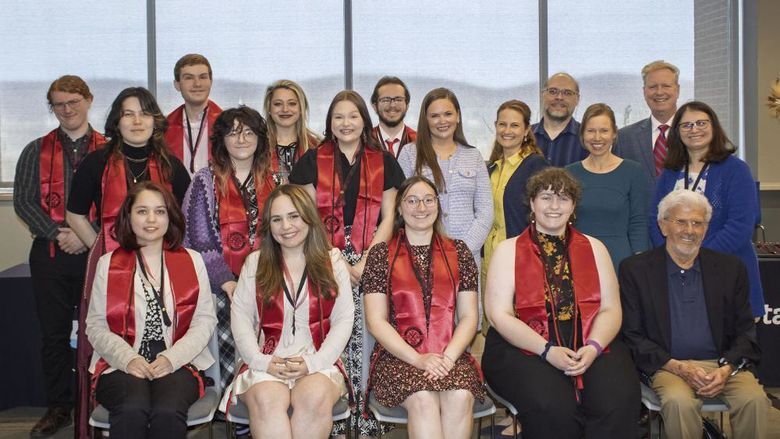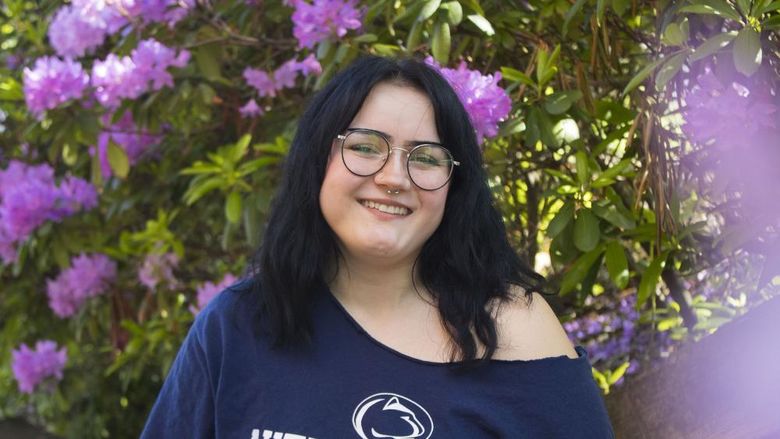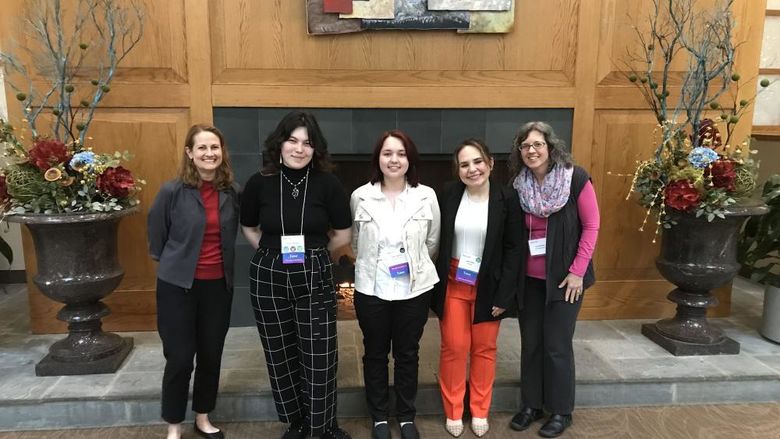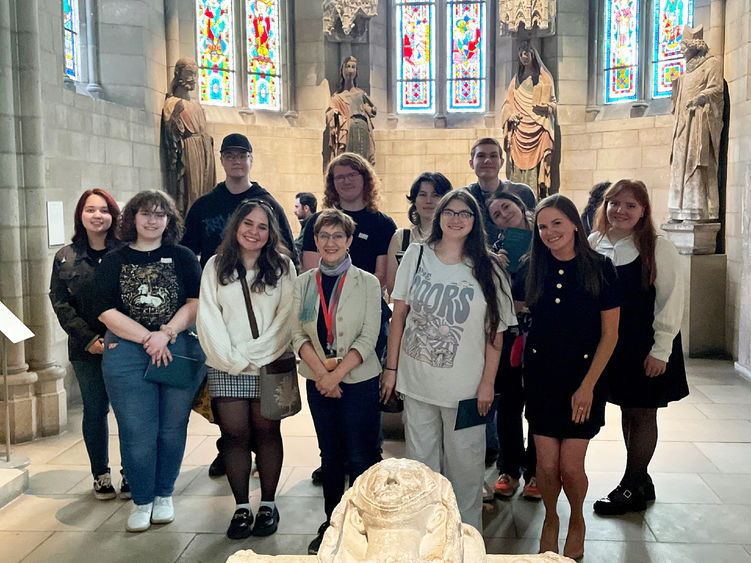
Students from Associate Teaching Professor of English Kara Stone's medieval literature class traveled to New York City this semester to visit The Cloisters museum and personally experience some of the art and culture they were learning about in the classroom. First row, from left: River Moon, Halle O'Neill, Cloisters tour guide, Christina Buchinski and Stone. Second row, from left: Taylor Belknap, Andrew Phillips, Nicholas Lowe, Rowan Mulligan, Evan Bannon, Ellie Alin and Olivia Osborne.
DUNMORE, Pa. — Students from Penn State Scranton’s medieval literature class recently traveled to The Cloisters, a museum dedicated to the art and architecture of the Middle Ages, for an immersive learning experience that helped connect the class’ studies with real-world experiences through art and history.
The visit, arranged by Associate Teaching Professor of English Kara Stone and Chief Academic Officer Durrell Johnson, offered students a chance to explore the works of art and architecture they had studied in class. Located in Fort Tryon Park in New York City, The Cloisters is part of The Metropolitan Museum of Art and is the only museum in the United States specifically devoted to the art and architecture of the medieval period.
“I chose the location since The Met's Cloisters Museum is only a two-hour drive from campus,” Stone said. “Since the students are enrolled in my 400-level medieval literature course, where we discuss medieval society, art and history in relation to the texts, I thought they would enjoy an immersive experience that could connect them firsthand to the texts and help them visualize the Middle Ages.”
Stone said that since the class primarily focuses on medieval literature, she arranged for an art historian to serve as a professional tour guide for the students.
“I spoke with her before going to the museum about the works we were studying in class, and she highlighted pieces of art and architecture that corresponded to the class material,” Stone said.
An immersive learning experience for students
For student Halle O’Neil, the trip was an enriching experience that helped deepen her understanding of medieval history.
“I thought the English Department's trip to The Cloisters was a great way to add something extra to our understanding of Medieval Literature,” O’Neil said. “It was a great experience to be able to connect texts we read in class with art of the time period. Following this trip, I felt like I could better visualize and understand other medieval texts. I am so grateful to have been able to use this trip to enhance my learning both in and out of the classroom and I cannot thank Dr. Stone and Dr. Johnson enough for making that happen for our class.”
Student River Moon also enjoyed seeing the art and architecture discussed in class come to life.
“The trip was wonderful! My favorite part of our visit was seeing the large Unicorn Tapestries,” Moon said. “Dr. Stone had shown us pictures of them in class, and I loved them so much I bought a matching shirt, which I ended up wearing that day. The trip was a great bonding experience, and I really appreciate the effort Dr. Stone and Dr. Johnson put into making it happen.”
In addition to exploring the museum’s vast collection, the students also toured the museum’s gardens, which overlook the Hudson River. Stone said the trip was designed to provide students with an opportunity for immersive learning and foster a sense of community.
The trip to The Cloisters was an opportunity for the students to gain a deeper appreciation for medieval art and literature while also building connections with their peers and professors.
“These out-of-classroom activities allow for immersive learning that creates lasting memories and encourages students to explore the world around them,” Stone said. “With trips like these, students form a stronger sense of community through shared experience and realize there is so much to learn and explore outside of the classroom. I hope that they realize that what they study in the classroom can serve as inspiration for future travel and that learning never has to stop (even if undergraduate study does).”
Bachelor of arts degree in English
The English degree offers students the opportunity to explore the rhetorical traditions and rich literary heritage of various English-speaking cultures. English majors spend considerable time studying American and British literature and read widely in both fields. At the same time, the English major calls upon students to engage a variety of critical approaches to literature and culture and to study the art of writing. In short: English majors become well-rounded critical thinkers with an arsenal of skills coveted by various industries in a global economy with a need for expert communicators.
